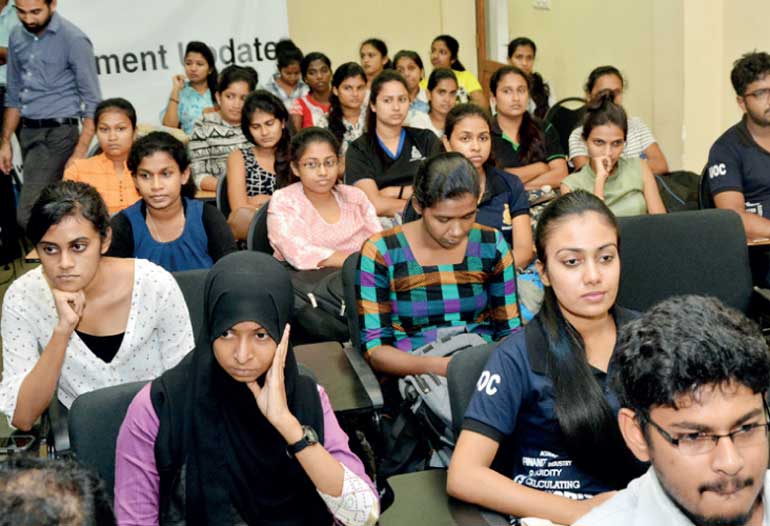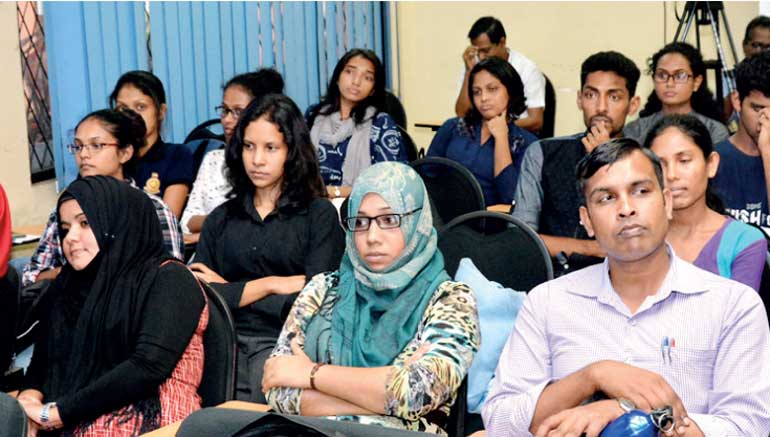Thursday Feb 26, 2026
Thursday Feb 26, 2026
Thursday, 30 November 2017 00:00 - - {{hitsCtrl.values.hits}}



By Charumini de Silva
Despite the Government revisiting its growth model and undertaking structural reforms, a top economist pointed that policymakers’ decision to place utmost importance on indirect taxes for revenue generation seems to be misplaced.
“The Government comes up with various reform models, but these kind of policies stop halfway and we have doubts on its decision to be fully dependent on indirect taxes for revenue generation,” University of Colombo Department of Economics Senior Lecturer Dr. M. Ganeshamoorthy said addressing at a public dialogue on the latest ‘Sri Lanka Development Update’ report of the World Bank recently.
He suggested that for the Government to increase and sustain growth, the country needs to move towards a more private investment-led and tradable sector driven model.
Although the Government has tried to increase the revenue approach without cutting expenditure he noted it had mainly focused on Value Added Taxes (VAT), which falls into the indirect tax category, while it should have been on direct taxes.
“What I see in this regard is that there is more focus on VAT. Of course depending on indirect taxes for Government’s revenue for a country like Sri Lanka we have a doubt. Even though there is a compensation mechanism for the more vulnerable groups in those segments, how are we going to implement that kind of a subsidy program or a compensation program in a society which is very complex?” he questioned.
Dr. Ganeshmoorthy pointed that there was a need for a special vehicle to improve direct taxation not from high percentages, but lower percentages of taxation which covers almost everyone in society.
Acknowledging the regaining of GSP+ was commendable, he expressed uncertainty on whether Sri Lanka was achieving the best out of the opportunity. “I don’t know if we can make it within the seven year grace period. Sri Lanka cannot do much to get the full benefit of it. By then our markets will be taken over by the competitors.”
He also said export diversification was not possible in a short period of time. “It is a long-term endeavour, which requires diversifying exports specially focusing on global value chains and production networks.”
In terms of Foreign Direct Investment (FDIs), he said it was imperative to create a conducive business environment to attract investment and there was a lot more to be done from the policy point of view.
“Recently there has been an increase in FDIs, mainly due to the Port City and especially from the construction industry. Those FDIs flowing into the country are investments going into the non-tradable sectors. It is also important to track to which sectors these investments are going into and whether they are getting high return or not,” he added.
Another observation was whether sectors that are growing in the economy can be sustainable in the long-run and whether the infrastructure now being built could produce tradable goods, what policies and project strategies the Government would adopt in order to derive the maximum of these investments and if they have high Return on Investments (ROIs).
“Our past experiences are such that the long-term investment projects were not paying back. As a result we have a huge debt burden. We have infrastructure, but they are not performing as expected.”
He said the Government needed to identify the next important sectors, which should be export oriented, noting that the construction boom had now reached a certain point where it would be difficult to maintain the same kind of growth in few years.
He stressed that the Government needed to have a policy on business as ad-hoc policy changes and overnight tax hikes on private investments were resulting in investors looking at other countries similar to Sri Lanka.
“At the moment I do not see any attractive packages for investors,” he added.
Noting that the external economy was good, Dr. Ganeshmoorty said Sri Lanka was in a position to attract more portfolio type of investments, which would ease the country’s debt problems in the short term. However, in the long run the investments have to be channelled to more productive sectors rather than only focusing on investments on non-tradable sectors.
University of Colombo Senior Lecturer of Economics Dr. Indrajith Aponsu said: “When a government comes into power, they make the best use of policy in the first year. But unfortunately we missed that target and now we are in difficult situation.” The public dialogue was organised by the World Bank in collaboration with the Department of Economics and the Economics Students’ Association of University of Colombo.
Pix by Upul Abayasekera